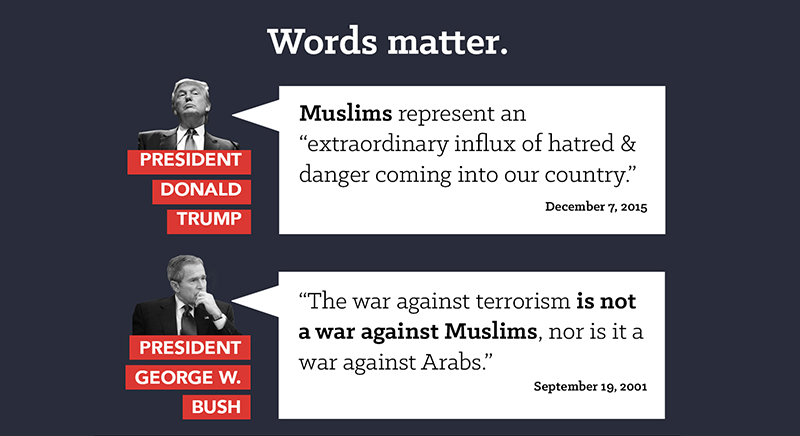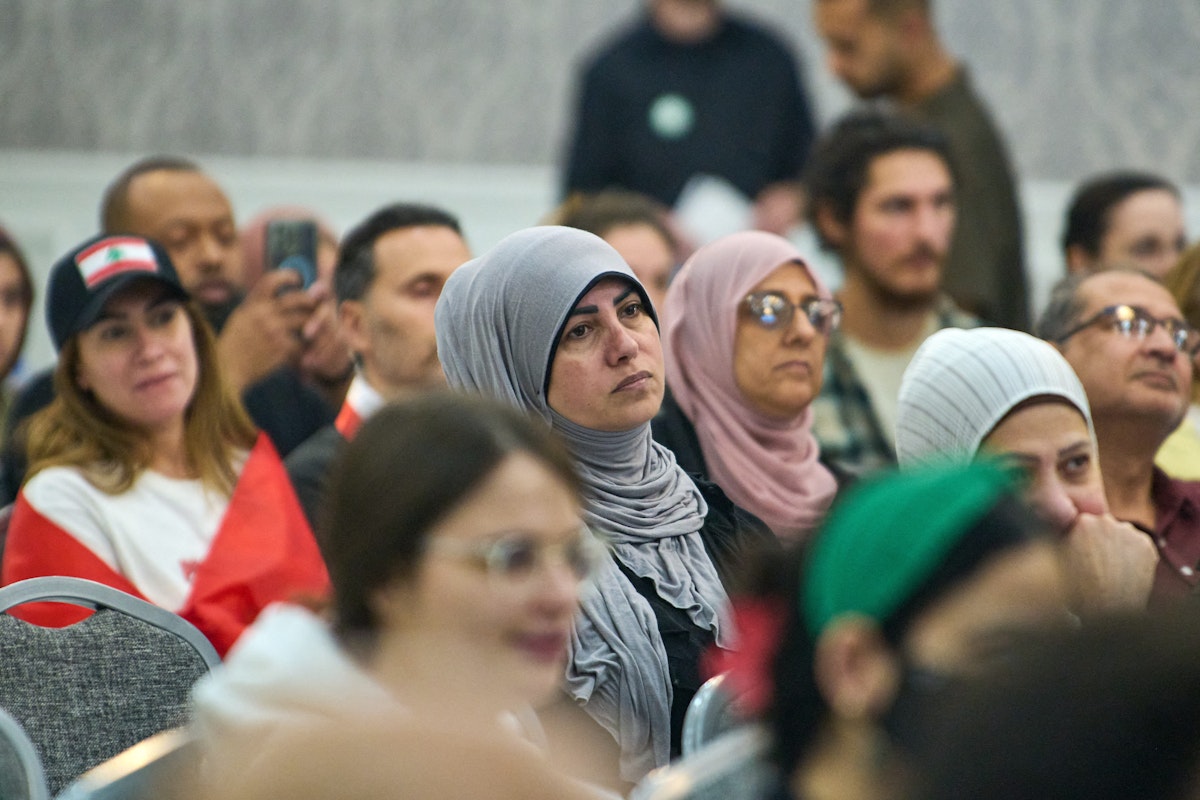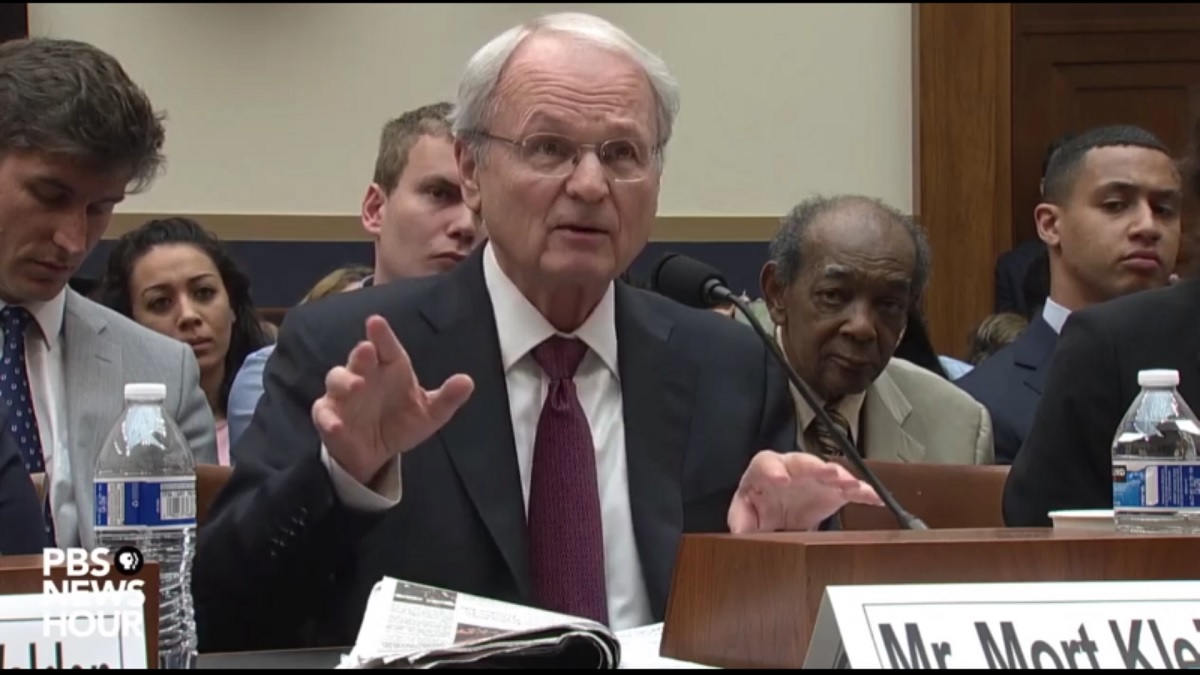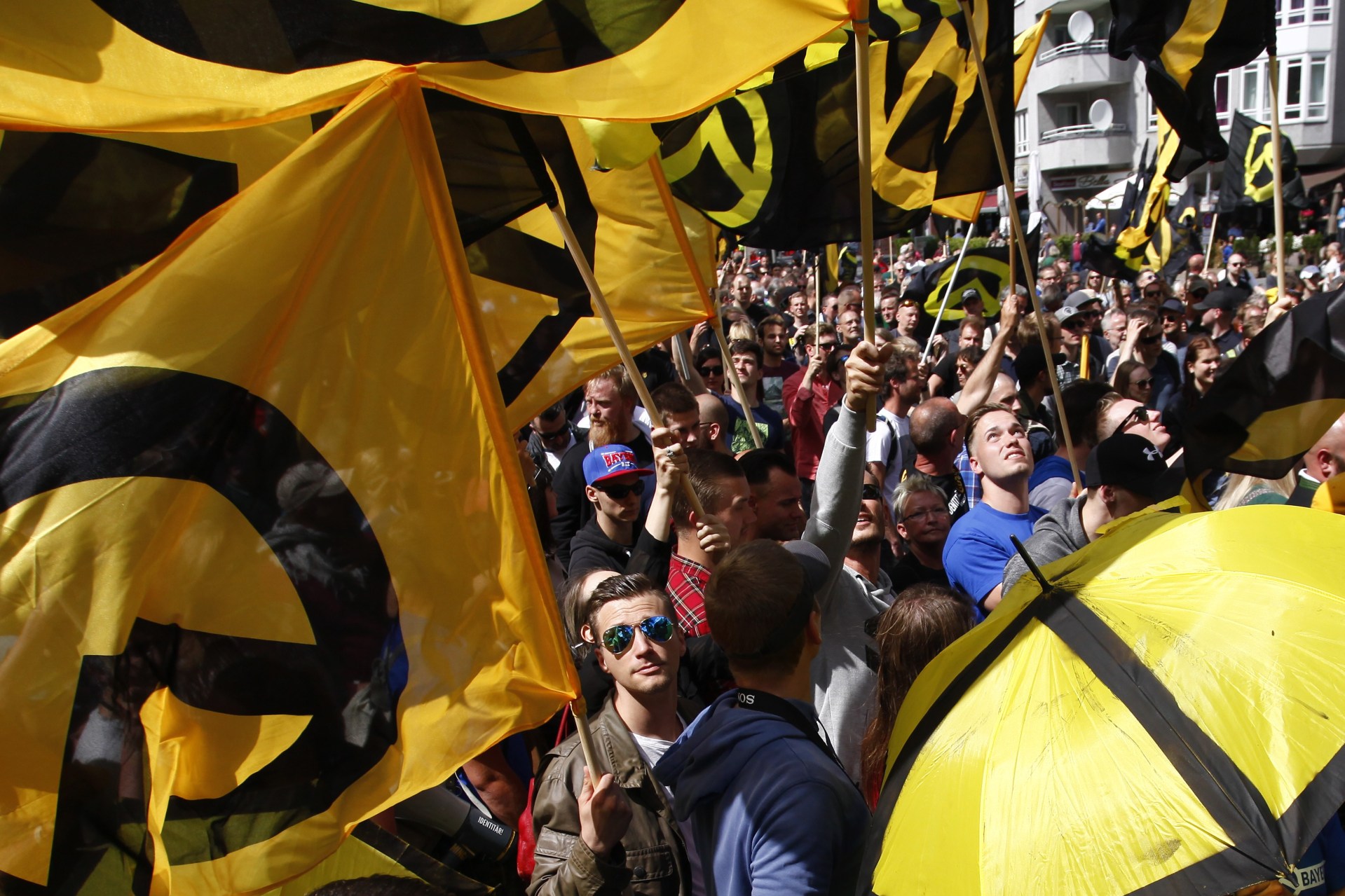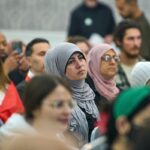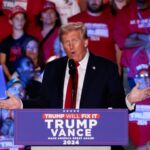- Government Targeting of Minority Communities
- Many antiterrorism initiatives unfairly target Muslims and people of color. These policies violate constitutional values of fairness, equality, and freedom of religion.
Analysis of Islamophobia Under Trump’s Administration
Donald Trump’s vitriolic anti-Muslim campaign rhetoric was a preview for an unprecedentedly Islamophobic administration. In a new analysis, the Brennan Center identifies how the president and his White House staff and advisors have targeted Muslims through both speech and policy, tangibly harming the American Muslim community, in at least five forms: the use of anti-Muslim rhetoric; the elevation of Islamophobic staff members to key positions in the White House; the ban on visitors from seven Muslim-majority countries from entering the country; the goal of making vetting procedures “extreme” for potential visitors and immigrants; and a lack of response to the rise in hate crimes targeted at Muslims and other groups.
Introduction
This report examines the Trump presidency through the lens of its impact on American Muslims. During the campaign, President Donald Trump trafficked in anti-Muslim rhetoric, and proposed laws and policies targeting American Muslim communities. The first few months of his administration have seen sustained attempts to put those proposals into action. Within a week of taking office, Trump issued an executive order banning entry to the U.S. by travelers from seven Muslim countries, along with all refugees. Stymied by court rulings halting implementation of the order, he revised the ban to remove its obviously discriminatory provisions (such as a de facto exemption for Christians), but the latest version of the ban has also been enjoined by federal courts. In the meantime, the administration has moved to develop a system of “extreme vetting” that is likely to apply with particular intensity to Muslim travelers.
Upon taking office, Trump quickly installed notorious Islamaphobes — including Steve Bannon, Michael Flynn, and Sebastian Gorka — in the White House. Trump’s own blatantly anti-Muslim rhetoric has emboldened people to act on their prejudices, and hate crimes against Muslims have soared. In sum, Trump has created the most Islamophobic administration our country has seen.
You may be interested
This agenda should not, however, be viewed as a complete aberration. In some ways, it is an amplification and extension of practices and policies that became par for the course in post-September 11 America. President George W. Bush built, and President Barack Obama allowed to stand, national security laws and policies that treat American Muslims as suspects, subjecting them to widespread surveillance and preemptive prosecution. Travel to the U.S. from most majority Muslim countries was never easy, and extreme vetting has long been a reality for American Muslims, especially after the 9/11 attacks. Islamophobes have trained our soldiers and law enforcement officers and regularly testified at Congressional hearings. Hate crimes against Muslims have been an ongoing problem, with rates spiking after the attacks of 9/11 and showing an overall increase since 2010.1
Resistance Movement Emerges Against Trump’s Muslim Ban
Trump’s actions have galvanized a robust resistance movement, with thousands of people taking to the streets and airports across the country to protest his ban on Muslims entering the country. His personnel choices have been criticized across the political spectrum, as has his silence on attacks on Muslims. All this is heartening, but the continuity between Trump’s policies and those of his predecessors must inform efforts both to push back against his blatant discrimination against Muslims and to shape new laws and policies that ensure equality and security for all Americans.
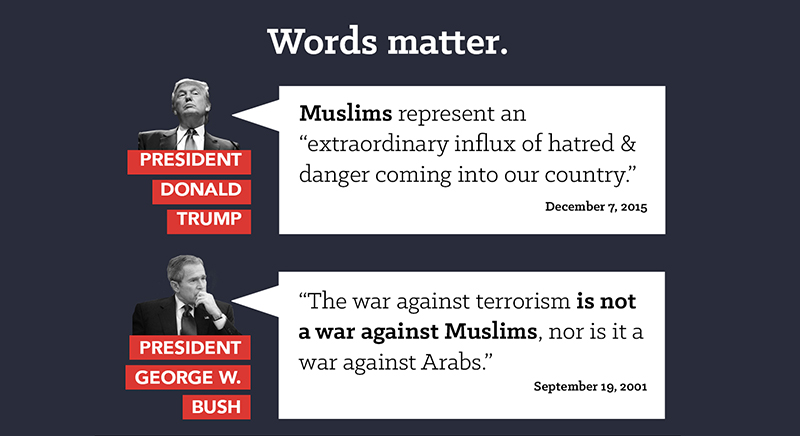
Trump’s Anti-Muslim Rhetoric
Trump’s inflammatory rhetoric on Islam, and more generally on immigrants and foreigners, defined much of his campaign and laid the foundation for the policies he would implement, the advisors he would put into place, and the growing fears that American Muslims have for their safety and the safety of their families. To be sure, there is a long and sorry history of politicians ginning up fear and baseless prejudice against the Muslim community, but now it has made its way to the White House. During the campaign, Trump consistently expressed suspicion and fear of Islam and Muslims:
He stated categorically that “Islam hates us,” and refused to dismiss the possibility that hate was “in Islam itself.”2
He called for a prohibition on Muslims entering the country, as described in more detail below.
He proposed surveilling “certain mosques” and referred approvingly to the New York City Police Department’s (NYPD’s) program of mosque surveillance in the years after the 9/11 attacks, undeterred by the fact that its constitutionality had been challenged in three lawsuits, one of which was recently settled with the police agreeing to changes in the way they conduct investigations and accepting more robust external oversight.3
He repeated a disproven canard that Muslims in New Jersey cheered when the World Trade Center buildings fell on 9/11 — even claiming, impossibly, that he saw it on television.4
He insinuated that “the Muslim community does not report” terrorists in their midst, a charge that the FBI itself says is flatly contradicted by the evidence.5
Trump’s Controversial Proposal for Muslim Registry
He endorsed the idea of requiring Muslims in the United States to register in a special database — a proposal he backed away from after criticisms that it resembled registration of Jews in Nazi Germany.6 One of his surrogates suggested that Japanese internment camps served as a suitable precedent for the Muslim registry, despite the fact that the camps and the Supreme Court decision upholding them have been repudiated by a bipartisan Congressional commission, bipartisan legislation signed by President Reagan, and numerous judges and legal scholars.7
Trump has carried his suspicion of American Muslims into office. Most recently, his administration signaled that it planned to rebrand the government’s program on Countering Violent Extremism, or CVE, to focus solely on Islamic extremism.8 Even when CVE was ostensibly targeted at all forms of violent extremism, it was highly controversial because in practice it was directed mainly at Muslims and provided ample opportunities for law enforcement to spy on these communities.9 Removing the veneer of neutrality would only increase the stigma associated with CVE and the likelihood that it would be used by law enforcement agents as an intelligence gathering tool.
Contrast Between Trump and Previous Republican Presidents on Islam
Trump’s unrelenting hostility towards Muslims is particularly striking in light of the very different approach taken by other Republican presidents. President George W. Bush observed that “Islam brings hope and comfort to millions of people in my country,” and emphasized that “we respect people of all faiths and welcome the free practice of religion.”10 Not long after signing legislation requiring the collection and publication of data about hate crimes, his father, President George H.W. Bush, publicly condemned anti-Muslim discrimination and urged Americans to “join together to rid our communities of the poison of prejudice, bias, and discrimination.”11 Presidents Gerald Ford and Dwight D. Eisenhower similarly recognized the contributions of the Islamic world and the links between Muslims and other people of faith.12
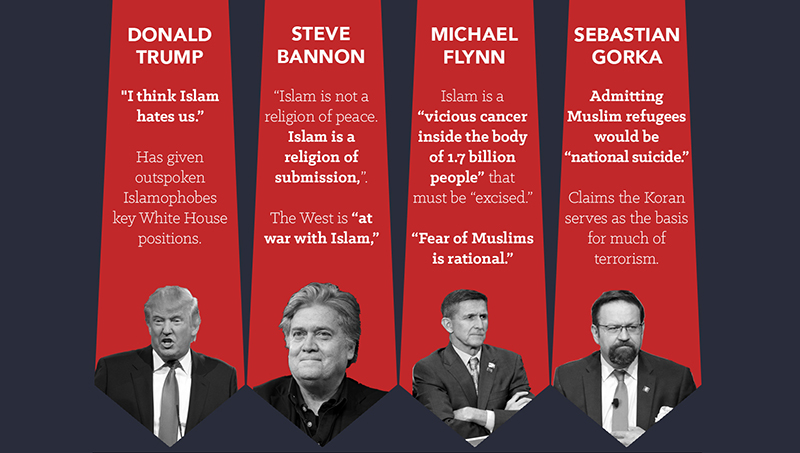
Islamophobes in the White House
For more than a decade, fringe voices have sought to demonize Islam, a religion practiced by 1.5 billion people, including millions of Americans. Three themes have been prominent in this discourse: first, that Islam is not a legitimate religion, but a dangerous political ideology. Second, that the United States and other Western countries are engaged in an existential war with Islam. And third, that American Muslim civil society organizations and prominent Muslim public figures serve as fronts for the Muslim Brotherhood, which itself is a broad social and political movement that has never been designated as a foreign terrorist organization by the United States.13
Impact of Extremist Theories on Trump Administration Policies
These theories justify aggressive military action abroad and the repression of American Muslims at home through invasive surveillance, religious and ethnic profiling, and the jettisoning of fundamental constitutional protections for religious freedom. Individuals holding these once fringe views now occupy central roles in the Trump administration and appear to have a major hand in shaping blatantly discriminatory policies such as the Muslim ban and the “extreme vetting” procedures being developed by the Department of Homeland Security (DHS).
A trio of men exemplify anti-Islam voices in the White House: Steve Bannon, the President’s Senior Advisor; Michael Flynn, who until recently served as the President’s National Security Advisor; and Sebastian Gorka, Deputy Assistant to the President. Their Islamophobic views have been widely reported:
Steve Bannon has said that “Islam is not a religion of peace. Islam is a religion of submission,” and has claimed that the West is “at war with Islam.”14
Michael Flynn has called Islam a “vicious cancer inside the body of 1.7 billion people” that must be “excised” and said that “fear of Muslims is rational.”15
Sebastian Gorka has argued that admitting Muslim refugees would be “national suicide” and claims that Islam and the Koran serve as the basis for much of terrorism.16
All of these men are closely connected to Frank Gaffney, who heads the Center for Security Policy, a think tank known for promoting an anti-Muslim agenda based on shoddy research.17 For example, Gaffney has promoted legislation to ban Sharia — which can loosely be defined as Islamic law and customs, including the basic tenets of prayer, fasting, charity, pilgrimage, and avowing faith in Allah — in U.S. courts.18 Anti-Sharia legislation is a solution in search of a problem: Islamic law is used in U.S. courts in adjudicating a small number of cases, such as contract disputes where the parties have chosen it as the applicable law, but only when it does not conflict with fundamental principles of American law.19 Indeed, federal courts have found anti-Sharia bills to be unconstitutional because they target one faith.20 Gaffney, however, claims Islam is not a religion entitled to protection under the First Amendment but a totalitarian ideology.21 He is also a leading proponent of the outlandish theory that the Muslim Brotherhood controls American Muslim civil society groups, a position that is derided as fantasy even by staunch critics of the Brotherhood.22
Flynn has been fired, and there are rumblings that Bannon and perhaps even Gorka may be on their way out — all for reasons apparently unrelated to their Islamophobia. Most recently, Bannon was removed from the National Security Council. But two members of Trump’s cabinet also have troubling records. Mike Pompeo, the new Director of the Central Intelligence Agency, has appeared on Gaffney’s radio program over a dozen times in the past four years and has falsely claimed that “Islamic advocacy organizations and many mosques across America” do not condemn terrorism and are “potentially complicit” in “extremism.”23 Attorney General Jeff Sessions has a long record of hyping alleged threats from Muslim immigration.24 Periodic staff changes aside, Trump appears to have built a team characterized by its determination to view Islam itself as a threat to the United States.
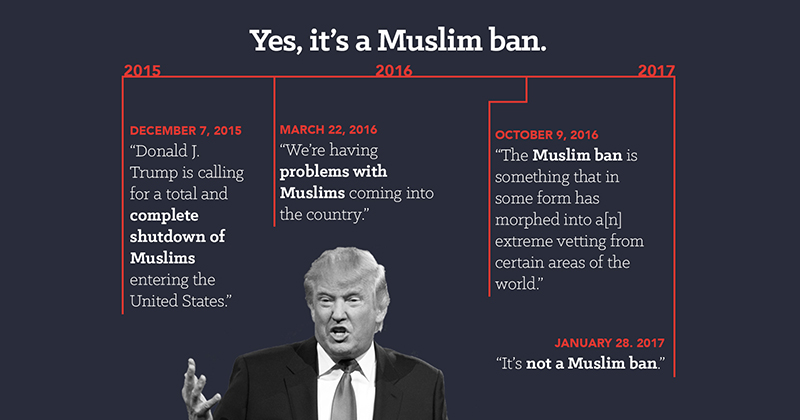
Banning Muslims from America
Exactly a week after his inauguration, Trump took the first step in delivering on his campaign promise of a “complete shutdown of Muslims entering the United States.”25 He signed an executive order banning the nationals of seven Muslim-majority countries from entering the country; the order also halted the entry of refugees for 120 days, while barring Syrian refugees indefinitely.26 The order applied even to legal permanent residents, many of whom had lived in the United States for years, as well as students and others holding valid visas. Evidence of the intent to bar Muslims was found on the face of the order, which allowed exemptions for religious minorities from the seven Muslim countries — that is, non-Muslims.
Federal courts quickly stopped implementation of the order. A second version of the Muslim ban was issued on March 6, 2017.27 This time, legal permanent residents and those holding valid visas were exempt. Iraq was dropped from the list of countries covered by the ban and the explicit preference for non-Muslims was removed. The new rule did not pass muster with the courts either, with two federal courts blocking the government from implementing key parts.
Trump’s travel bans were enjoined because courts recognized that — despite the administration’s claims of national security — they were aimed at excluding Muslims from the United States. This contravenes the Establishment Clause of the First Amendment to the Constitution, which prohibits the government from favoring one faith over another. Courts did not have to look far to find evidence of the intent behind the orders. Trump’s own statements and those of his close advisers provided plenty of fodder. For example:
Trump Press Release, Dec. 7, 2015: “Donald J. Trump is calling for a total and complete shutdown of Muslims entering the United States.”28
Trump on CNN’s 360 Degrees with Anderson Cooper, March 6, 2016: “I think Islam hates us.” His spokesperson Katrina Pierson added that the United States had “allowed this propaganda to spread all through the country that [Islam] is a religion of peace.”29
Trump in Fox Business interview, March 22, 2016: in reiterating his call for a ban on Muslim immigration, he explained that “we’re having problems with the Muslims, and we’re having problems with Muslims coming into the country.”30
Trump during the second Presidential Debate, Oct. 9, 2016: “The Muslim ban is something that in some form has morphed into a[n] extreme vetting from certain areas of the world.” When asked to clarify whether “the Muslim ban still stands,” Mr. Trump said, “It’s called extreme vetting.”31
Trump adviser Rudolph Giuliani explaining on television how the Executive Order came to be, Jan. 28, 2017: “When [Mr. Trump] first announced it, he said, ‘Muslim ban.’ He called me up. He said, ‘Put a commission together. Show me the right way to do it legally.’”32
Evidence like this led a federal district court in Hawaii to conclude that the statements that were made
in the months leading up to and contemporaneous with the signing of the Executive Order, and, in many cases, made by the Executive himself, betray the Executive Order’s stated secular purpose. Any reasonable, objective observer would conclude … that the stated secular purpose of the Executive Order is, at the very least, ‘secondary to a religious objective’ of temporarily suspending the entry of Muslims.33
Similarly, a federal district court in Maryland found that:
These statements, which include explicit, direct statements of President Trump’s animus towards Muslims and intention to impose a ban on Muslims entering the United States, present a convincing case that the First Executive Order was issued to accomplish, as nearly as possible, President Trump’s promised Muslim ban.34
Both the Hawaii and Maryland decisions were entered in preliminary proceedings where the courts were asked to preliminarily judge the likelihood that challenges to Trump’s order would succeed. Other courts have looked at the same statements by Trump and his advisers and nonetheless allowed the executive order to stand.35 The decisions enjoining the orders are currently being appealed, and ultimately the matter will likely be decided by the U.S. Supreme Court.
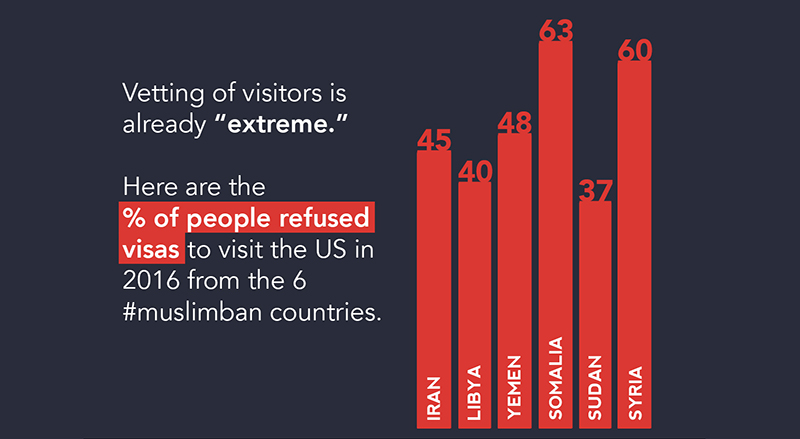
Extreme Vetting
As noted above, shortly after becoming the official Republican presidential nominee, Trump rolled out a new plan: “extreme vetting” for Muslims entering the the United States.36 He proposed that the United States admit only those “who share our values and respect our people.” One campaign official explained that people who have “attitudes about women or attitudes about Christians or gays that would be considered oppressive” would be barred.37
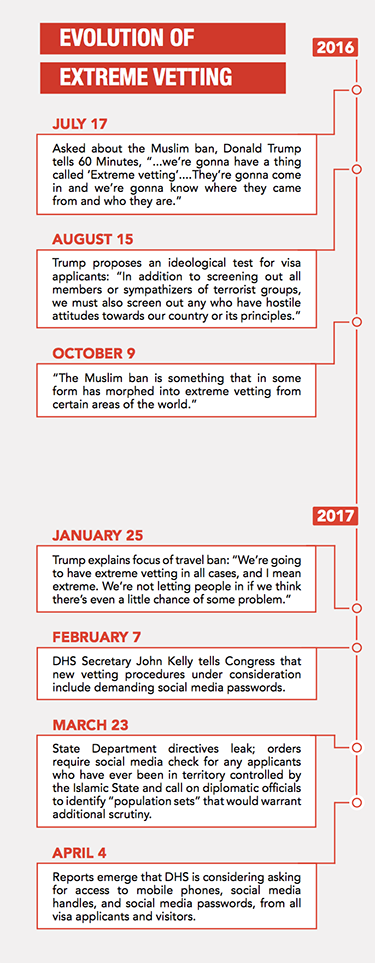
Perhaps most alarmingly, proponents of the ban describe the process as instituting “a kind of ideological screening.”38 While cloaked in a security rationale, the emerging procedure appears to be targeted specifically at Muslims: Department of Homeland Security officials have indicated, for instance, that the procedure currently under discussion for visa applicants would query travelers about honor killings, the role of women in society, and legitimate military targets.39 It is difficult to see the connection between a visitor’s view of the role of women in society and terrorism, but the connection between such questions and criticisms of the rights of women in Muslim societies is plain.40 Relatedly, travelers have already begun to field invasive questions about their beliefs, with some reportedly being asked whether they are Sunni or Shiite and why they are carrying a Quran in their luggage.41
Soon after taking office, Trump seized the opportunity to begin carrying out this campaign promise, incorporating into the first travel ban executive order a requirement that a new vetting process be developed. While the bans have been stayed for now, the work on the vetting procedures appears to be continuing apace, and the clues that have emerged paint a picture of a system custom-made to discriminate against Muslims.
Recent reports suggest the extreme vetting procedures may be instituted for travelers from a number of countries, including many of America’s closest allies; these procedures could include, as a precondition for receiving even a visitor visa, requirements that applicants show immigration officials the contacts in their phones and reveal their social media handles and passwords.42 And while the policy may be facially applicable to visitors from all countries, the focus on ideological issues that are often associated with Islam means that it is almost certain to be disproportionately targeted at Muslims.
To be sure, ideological vetting has a long history. Anarchists were banned beginning in the early 20th century, and Communists have been on the banned list as well.43 But concerns about ideological exclusion led Congress to add a provision to the immigration law banning certain instances of the practice. 44 Not only is ideological vetting at odds with our country’s history as an open democracy that welcomes robust debate, it relies on the disproven assumption that certain beliefs themselves constitute a security threat.45
Moreover, aspiring immigrants and refugees are already subjected to rigorous checks. Applicants for immigrant visas are interviewed and generally require a full medical exam and the collection of biometric data, a process that can take, in extreme cases, up to ten years.46 The process also includes security screenings, which can occupy an extended period of time for applicants coming from countries with an elevated risk of terrorism.47 Refugee visas are even more time-intensive, involving as many as 20 steps, including “multiple interviews and a security vetting by nine U.S. law enforcement, intelligence and security agencies that check their backgrounds, social media activity and the reasons they fled their countries,” a process that can take up to two years — a long wait for vulnerable populations fleeing desperate situations.48 And any visa applicant can expect to be checked against databases administered by the Department of Homeland Security, Federal Bureau of Investigation, and other agencies to confirm that they do not pose a security risk.49
In addition, many of the proposed tests are likely to be ineffective. As a former Commissioner of the Immigration and Naturalization Service has pointed out, ideological tests do not accurately predict how people will actually behave.50 Likewise, demands for access to would-be travelers’ cell phones will inevitably drive bad actors to change their practices by buying “clean” phones or undertaking other measures, undermining any possible utility of the initiative. These tests are therefore likely to be highly counterproductive, undermining the historical tradition of the U.S. as a pluralistic, welcoming country without making Americans any safer.
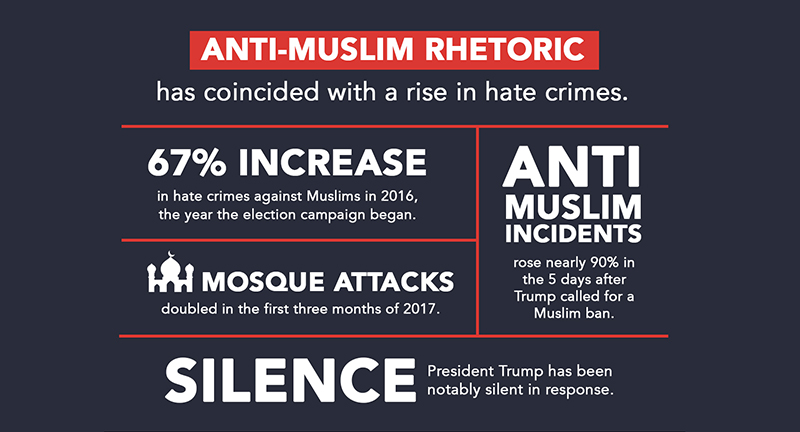
Hate Crimes
Anti-Muslim rhetoric amplified by Trump himself during the campaign and since the election and inauguration has coincided with a rise in hate crimes. According to the FBI, during 2015, the year the presidential campaign season kicked off, hate crimes against Muslims soared nearly 67 percent — to the highest level since 9/11.51 A soon-to-be-published report from the Council on American-Islamic Relations is expected to show that 2016 was the worst year on record for incidents in which mosques were targets of bias.52 In the first three months of 2017, violence, vandalism, and aggression toward mosques doubled compared to the previous year.53
Following the election, reports of anti-Muslim incidents mounted. The Southern Poverty Law Center, an organization that tracks hate groups and hate crimes, collected anecdotes about hundreds of incidents of hate and intimidation towards a range of groups in the five days post-election.54 These included an account of a Muslim woman on an Oregon commuter train who was confronted by a group of teenagers who called her a terrorist, threatened that Trump was going to deport her, and told her she could not wear her hijab anymore; in Gwinnett County, Georgia, a Muslim high school teacher received a note saying that her headscarf “isn’t allowed anymore” and that she should hang herself with it. The stories have not abated; from the end of January 2017 through the end of March, there were approximately 32 anti-Muslim and anti-Arab incidents, or an average of one every other day.55
And while suggesting that Trump’s rhetoric “caused” hate crimes is much too simplistic, some perpetrators have not been not shy about invoking the president as their inspiration. In March, a note left at an Islamic Center in Des Moines, Iowa, threatened that the “new sheriff in town — President Donald Trump” was “going to cleanse America” and would “start with you Muslims”; other Islamic centers have received similar notes.56 Last December, a motorist called a Muslim Uber driver a “scumbag” and “terrorist,” yelling at him that because Trump had been elected president, “you can kiss your visa goodbye” because “they’ll deport you soon.”57
At the same time, even in the face of entreaties from the affected communities, Trump has been notably silent in response to bias-motivated crimes. A week after an Indian engineer was killed in Olathe, Kansas, by a man who mistook his nationality for Iranian, Trump had yet to issue a statement.58 Similarly, after a wave of post-inauguration incidents targeting Jewish cemeteries and community centers, he waited weeks to address and finally condemn the events, drawing criticism from the Anne Frank Center for Mutual Respect and Jewish leaders.59
Perhaps the starkest example of the “Trump effect,” however, comes from the spike in hate crimes after he announced his proposal to ban Muslims entering the United States. On December 7, 2015, Trump posted a statement on his campaign website calling for a “complete and total shutdown of Muslims entering the United States until our country’s representatives can figure out what is going on.”60 He followed up the online posting with tweets and a public announcement at a campaign rally that evening. In the subsequent five days, anti-Muslim incidents in the United States rose nearly 90 percent as compared to the five days prior to the announcement.61
By contrast, on September 17, 2001 — six days after the attacks of September 11 — George W. Bush visited an Islamic Center in Washington, D.C. to meet with American Muslim leaders. He gave a speech titled “Islam is Peace,” lauding the contributions of American Muslims and urging Americans to treat each other with respect. In the following days, anti-Muslim hate crimes dropped by a substantial margin as compared to the days before the speech.62 While Trump may not be responsible for every incident of hate and intolerance that occurs in his America, history shows that words do matter.
* * * * *
Well before the 100-day mark of his presidency, President Trump and his associates have shown themselves willing to turn anti-Muslim rhetoric and policy ideas into action. We can anticipate more measures focusing on these communities, some of which may be obvious and overt (such as the registry he once suggested), while others will likely be more insidious and harder to expose (such as increased surveillance of Muslim communities). In order to ensure safety, liberty and justice for all Americans, we must keep a keen watch and stand ready to oppose laws, polices and practices animated by prejudice against Muslims.
Full credits
________________________________________________________________________________________________________________
Endnotes
1 Katayoun Kishi, “Anti-Muslim assaults reach 9/11-era levels, FBI data show,” Pew Research Center, November 21, 2016, http://www.pewresearch.org/fact-tank/2016/11/21/anti-muslim-assaults-reach-911-era-levels-fbi-data-show/; Veronica Rocha, “San Francisco man threatened to shoot Muslim woman in alleged hate crime, police say,” Los Angeles Times, March 23, 2017, http://www.latimes.com/local/lanow/la-me-ln-san-francisco-hate-crime-muslim-woman-20170323-story.html.
2 Theodore Schleifer, “Donald Trump: ‘I think Islam hates us’,” CNN, March 10, 2016, http://www.cnn.com/2016/03/09/politics/donald-trump-islam-hates-us/.
3 Maggie Haberman, “Donald Trump Calls for Surveillance of ‘Certain Mosques’ and a Syrian Refugee Database,” New York Times, November 21, 2015, https://www.nytimes.com/2015/11/22/us/politics/donald-trump-syrian-muslims-surveillance.html; Clayton Youngman, “Trump says NYPD used to spy on mosques,” Politifact.com, November 20, 2015, http://www.politifact.com/truth-o-meter/statements/2015/nov/20/donald-trump/trump-says-nypd-used-spy-mosques/; Philip Bump, “Surveilling Mosques? The NYPD has already tried the things proposed by 2016 Republicans,” Washington Post, November 23, 2015, https://www.washingtonpost.com/news/the-fix/wp/2015/11/23/surveiling-mosques-the-nypd-has-already-tried-the-things-proposed-by-2016-republicans/?utm_term=.9d57c9180fe4; Chris Fuchs, “Judge Approves Settlement Over Post-9/11 NYPD Muslim Surveillance,”NBC News, March 22, 2017, http://www.nbcnews.com/news/asian-america/judge-approves-settlement-over-post-9–11-nypd-muslim-surveillance-n737101.
4 Lauren Carroll, “Fact-checking Trump’s claim that thousands in New Jersey cheered when World Trade Center tumbled,” Politifact.com, November 22, 2015, http://www.politifact.com/truth-o-meter/statements/2015/nov/22/donald-trump/fact-checking-trumps-claim-thousands-new-jersey-ch/.
5 Kristina Cooke and Joseph Ax, “FBI to Trump: You’re wrong about Muslims reporting extremist threats,” Reuters, June 16, 2016, http://www.businessinsider.com/r-us-officials-say-american-muslims-do-report-extremist-threats-2016–6.
6 Trip Gabriel, “Donald Trump Says He’d ‘Absolutely’ Require Muslims to Register,” New York Times, November 20, 2015, https://www.nytimes.com/politics/first-draft/2015/11/20/donald-trump-says-hed-absolutely-require-muslims-to-register/.
7 David Sklansky, “Japanese Internment Case Not ‘Good Law’,” Stanford Law School Blogs, November 18, 2016, https://law.stanford.edu/2016/11/18/korematsu-is-not-good-law/.
8 Julia Ainsley, Dustin Volz, and Kristina Cooke, “Exclusive: Trump to focus counter-extremism program solely on Islam,” Reuters, February 2, 2017, http://www.reuters.com/article/us-usa-trump-extremists-program-exclusiv-idUSKBN15G5VO.
9 Faiza Patel and Megan Koushik, Countering Violent Extremism, Brennan Center for Justice, 2017, 9–10.
10 “Backgrounder: The President’s Quotes on Islam,” White House Archives, accessed April 11, 2017, https://georgewbush-whitehouse.archives.gov/infocus/ramadan/islam.html.
11 “Hate Crimes Timeline,” Human Rights Campaign, accessed April 11, 2017, http://www.hrc.org/resources/hate-crimes-timeline; “George H.W. Bush on Discrimination Against Muslims in White House Question-and-Answer Session,” Berkley Center for Religion, Peace & World Affairs at Georgetown University, accessed April 11, 2017, https://berkleycenter.georgetown.edu/quotes/george-h-w-bush-on-discrimination-against-muslims-in-white-house-question-and-answer-session.
12 “Gerald Ford on Ramadan in a White House Statement,” Berkley Center for Religion, Peace & World Affairs at Georgetown University, accessed April 11, 2017, https://berkleycenter.georgetown.edu/quotes/gerald-ford-on-ramadan-in-a-white-house-statement; “Dwight Eisenhower on the Cultural Contributions of Muslims at Ceremonies Opening the Islamic Center,” Berkley Center for Religion, Peace & World Affairs at Georgetown University, accessed April 11, 2017, https://berkleycenter.georgetown.edu/quotes/dwight-eisenhower-on-the-cultural-contributions-of-muslims-at-ceremonies-opening-the-islamic-center.
13 Michael German and Faiza Patel, “What Does it Mean to Designate the Muslim Brotherhood a Foreign Terrorist Organization?”, Just Security, January 26, 2017, https://www.justsecurity.org/36826/designate-muslim-brotherhood-foreign-terrorist-organization/.
14 Andrew Kaczynski, “Steve Bannon in 2010: ‘Islam is not a religion of peace. Islam is a religion of submission’,” CNN, January 31, 2017, http://www.cnn.com/2017/01/31/politics/kfile-bannon-on-islam/; Clark Mindock, “Steve Bannon allegedly said he ‘believes the West is at war with Islam’,” Independent, February 14, 2017, http://www.independent.co.uk/news/world/americas/steve-bannon-war-islam-muslims-alt-right-donald-trump-a7580336.html; Scott Shane, “Stephen Bannon in 2014: We Are at War with Radical Islam,” New York Times, February 1, 2017, https://www.nytimes.com/interactive/2017/02/01/us/stephen-bannon-war-with-radical-islam.html.
15 Andrew Kaczynski, “Michael Flynn in August: Islamism is a ‘vicious cancer’ in body of all Muslims that ‘has to be excised’,” CNN, November 22, 2016, http://www.cnn.com/2016/11/22/politics/kfile-michael-flynn-august-speech/; Allegra Kirkland, “5 Points on Trump’s Anti-Muslim National Security Adviser Michael Flynn,” TalkingPointsMemo.com, November 18, 2016, http://talkingpointsmemo.com/fivepoints/michael-flynn-trump-national-security-adviser-what-you-need-to-know.
16 Laura Stampler, “Trump’s Deputy Assistant, Sebastian Gorka, Has Frequently Denounced Islam,” Teen Vogue, February 22, 2017, http://www.teenvogue.com/story/trumps-deputy-assistant-sebastian-gorka-has-frequently-denounced-islam; Allegra Kirkland, “How did Sebastian Gorka Go From The Anti-Muslim Fringe To White House Aide?,” TalkingPointsMemo.com, February 9, 2017, http://talkingpointsmemo.com/dc/sebastian-gorka-washington-experts-dc-anti-islam-ties.
17 Josh Harkinson, “Campaign CEO Was a Big Promoter of Extremists,” Mother Jones, September 15, 2016, http://www.motherjones.com/politics/2016/09/stephen-bannon-donald-trump-muslims-fear-loathing; Kirkland, “How did Sebastian Gorka Go From the Anti-Muslim Fringe to White House Aide?”; Stephen Piggot, “Trump’s National Security Advisor’s Twitter Account Shows Extent of Anti-Muslim Beliefs,” Southern Poverty Law Center, December 20, 2016, https://www.splcenter.org/hatewatch/2016/12/20/trumps-national-security-advisors-twitter-account-shows-extent-anti-muslim-beliefs; Philip Bump: “Meet Frank Gaffney, the anti-Muslim gadfly reportedly advising Donald Trump’s transition team,” Washington Post, November 16, 2016, https://www.washingtonpost.com/news/the-fix/wp/2015/12/08/meet-frank-gaffney-the-anti-muslim-gadfly-who-produced-donald-trumps-anti-muslim-poll/.
18 Andrea Elliott, “The Man Behind the Anti-Shariah Movement,” New York Times, July 30, 2011, https://nyti.ms/2k8q4YD.
19 Faiza Patel, Matthew Duss, and Amos Toh, Foreign Law Bans: Legal Uncertainties and Practical Problems, Brennan Center for Justice, 2013, 6–7.
20 Huma Khan, “Oklahoma’s Ban on Sharia Law Struck Down by Federal Appeals Court,” ABC News, January 11, 2012, http://abcnews.go.com/blogs/politics/2012/01/oklahomas-ban-on-Sharia-law-struck-down-by-federal-appeals-court/.
21 Sarah Posner, “Welcome to the Shari’ah Conspiracy Theory Industry,” ReligionDispatches.org, March 8, 2011, http://religiondispatches.org/welcome-to-the-Shariah-conspiracy-theory-industry/; Peter Beinart, “The Denationalization of American Muslims,” The Atlantic, March 19, 2017, https://www.theatlantic.com/politics/archive/2017/03/frank-gaffney-donald-trump-and-the-denationalization-of-american-muslims/519954/.
22 Beinart, “The Denationalization of American Muslims.”
23 CIA Director Mike Pompeo, speaking on H. 3258, on June 11, 2013, 113th Cong., 1st sess. Congressional Record 159.
24 Adam Serwer, “Jeff Sessions’s Fear of Muslim Immigrants,” Atlantic, February 8, 2017, https://www.theatlantic.com/politics/archive/2017/02/jeff-sessions-has-long-feared-muslim-immigrants/516069/; Alan Neuhauser, “Sessions Voices Opposition to Muslim Immigration Ban,” U.S. News, January 10, 2017, https://www.usnews.com/news/national-news/articles/2017–01–10/trump-nominee-jeff-sessions-voices-opposition-to-muslim-immigration-ban; Betsy Woodruff, “Trump Attorney General to Pick Jeff Sessions Argued for Religious Test to Ban Muslims,” Daily Beast, November 19, 2016, http://www.thedailybeast.com/articles/2016/11/19/trump-attorney-general-pick-jeff-sessions-argued-for-a-religious-test-to-ban-muslims.html.
25 “Donald J. Trump Statement on Preventing Muslim Immigration,” last modified December 7, 2015, https://www.donaldjtrump.com/press-releases/donald-j.-trump-statement-on-preventing-muslim-immigration.
26 Executive Order 13769 of January 27, 2017, Protecting the Nation From Foreign Terrorist Entry Into the United States, Federal Register 82, no. 20 (February 1, 2017): 8977, https://www.gpo.gov/fdsys/pkg/FR-2017–02–01/pdf/2017–02281.pdf.
27 Executive Order 13780 of March 6, 2017, Protecting the Nation from Foreign Terrorist Entry Into the United States, Federal Register 82, no. 45 (March 9, 2017): 13209, https://www.gpo.gov/fdsys/pkg/FR-2017–03–09/pdf/2017–04837.pdf.
28 “Donald J. Trump Statement” (see note 25 above).
29 Schleifer, “Donald Trump: ‘I think Islam hates us’” (see note 2 above).
30 Mark Hensch and Jesse Byrnes, “Trump: ‘Frankly, we’re having problems with the Muslims,” The Hill, March 22, 2016, http://thehill.com/blogs/ballot-box/presidential-races/273857-trump-frankly-were-having-problems-with-the-muslims.
31 Daniel Strauss, “Trump defends proposal for Muslim ban as call for ‘extreme vetting’,” Politico, October 9, 2016, http://www.politico.com/story/2016/10/2016-presidential-debate-donald-trump-muslim-ban-extreme-vetting-229468.
32 Amy Wang, “Trump asked for a ‘Muslim ban,’ Giuliani says – and ordered a commission to do it ‘legally’,” Washington Post, January 29, 2017, https://www.washingtonpost.com/news/the-fix/wp/2017/01/29/trump-asked-for-a-muslim-ban-giuliani-says-and-ordered-a-commission-to-do-it-legally/?utm_term=.b4c6902e4963.
33 State of Hawai’i and Ismail Elshikh v. Donald J. Trump, et al., No. 219 Civ. 00050 (D.Haw Mar. 15, 2017).
34 International Refugee Assistance Project, et al., v. Donald J. Trump, et al., TDC-17–0361 (D. Md. Mar. 15, 2017) (memorandum opinion).
35 Linda Sarsour, et al., v. Donald J. Trump, et al., No. 1:17 Civ. 00120 (E.D. Va. Mar. 24, 2017) (memorandum opinion); Arghavan Louhghalam, et al., v. Donald J. Trump, et al., No. 1:17 Civ. 10154 (D. Mass. Feb. 3, 2017).
36 Jeremy Diamond, “Trump proposes values test for would-be immigrants in fiery ISIS speech,” CNN, August 15, 2016, http://www.cnn.com/2016/08/14/politics/donald-trump-isis-fight/.
37 Ibid.
38 Deborah Amos, “Trump Backers Want Ideology Test for Extreme Vetting,” NPR, February 4, 2017, http://www.npr.org/sections/parallels/2017/02/04/513289953/trump-backers-want-ideology-test-for-extreme-vetting.
39 Laura Meckler, “Trump Administration Considers Far-Reaching Steps for ‘Extreme Vetting’,” Wall Street Journal, April 4, 2017, https://www.wsj.com/articles/trump-administration-considers-far-reaching-steps-for-extreme-vetting-1491303602.
40 Faiza Patel, “Reflections on the prejudice in the draft Exec Order’s vetting of ‘prejudice’,” Just Security, January 27, 2017, https://www.justsecurity.org/36898/reflections-prejudice-draft-exec-orders-vetting-prejudice/; Faiza Patel and Erica Posey, “Beware Trump’s Phony ‘Terror’ List,” Daily Beast, March 22, 2017, http://www.thedailybeast.com/articles/2017/03/22/beware-trump-s-phony-terror-list.html.
41 Marcy Kreiter, “Muslim Ban? Border and Immigration Officers Question Muslims About Their Religion and Politics, Civil Rights Group Complains,” International Business Times, January 18, 2017, http://www.ibtimes.com/muslim-ban-border-immigration-officials-question-muslims-about-their-religion-2477312.
42 Meckler, “Trump Administration” (see note 39 above).
43 Amos, “Trump Backers” (see note 38 above); Immigration and Nationality Act of 1952, 8 U.S.C. § 1182(3)(D)(i) (1952).
44 Immigration and Nationality Act of 1952, 8 U.S.C. § 1182(3)(C)(iii) (1952).
45 Patel and Koushik, “Countering Violent Extremism,” 9–10 (see note 9 above).
46 Lauren Said-Moorhouse and Ryan Browne, “Donald Trump wants ‘extreme vetting’ of immigrants. What is the US doing now?,” CNN, August 16, 2016, http://www.cnn.com/2016/08/16/politics/how-us-vets-immigrants-donald-trump-extreme-vetting/; “How Long Does it Take for an Immigrant to Legally Come to the United States?,” American Immigration Center, last modified December 12, 2011, https://www.us-immigration.com/us-immigration-news/us-immigration/how-long-does-it-take-for-an-immigrant-to-legally-come-to-the-united-states/.
47 Said-Moorhouse and Browne, “Donald Trump wants ‘extreme vetting’”.
48 Amos, “Trump Backers”; Haeyoun Park and Larry Buchanan, “Refugees Entering the U.S. Already Face a Rigorous Vetting Process,” New York Times, January 29, 2017, https://www.nytimes.com/interactive/2017/01/29/us/refugee-vetting-process.html?_r=0.
49 Benjamin Wittes and Susan Hennessey, “Memo to the NSC: Check Out Some Databases at the State Department before Finalizing that New Executive Order,” Lawfare, February 24, 2017, https://www.lawfareblog.com/memo-nsc-check-out-some-databases-state-department-finalizing-new-executive-order.
50 Amos, “Trump Backers.”
51 Matt Zapotosky, “Hate crimes against Muslims hit highest mark since 2001,” Washington Post, November 14, 2016, http://wapo.st/2fShPRG?tid=ss_tw-bottom
52 “CAIR-Sacramento Urges FBI to Probe Hate Vandalism Targeting Davis Mosque,” CAIR, last modified January 23, 2017, https://www.cair.com/press-center/press-releases/14033-cair-sacramento-urges-fbi-to-probe-hate-vandalism-targeting-davis-mosque.html.
53 Rachel Revesz, “U.S. Islamophobia: Threats and acts of vandalism against mosques double so far in 2017,” Independent, March 15, 2017, http://www.independent.co.uk/news/world/americas/us-mosques-threats-double-islamophobia-threats-vandalism-2017-cair-american-islamic-relations-a7631581.html.
54 “Update: More Than 400 Incidents of Hateful Harassment and Intimidation Since the Election,” Southern Poverty Law Center, last modified November 15, 2016, https://www.splcenter.org/hatewatch/2016/11/15/update-more-400-incidents-hateful-harassment-and-intimidation-election.
55 Anne Branigin, “A Timeline of Anti-Immigrant and Anti-Muslim Incidents Since Trump Took Power,” Fusion, last modified April 4, 2017, http://fusion.net/a-timeline-of-anti-immigrant-and-anti-muslim-incidents-1793772492.
56 Molly Longman, “Anti-Islam note leaves Des Moines community shaken,” Des Moines Register, March 20, 2017, https://www.usatoday.com/story/news/nation-now/2017/03/20/anti-islam-note-des-moines/99401366/.
57 Holly Yan, Kristina Sgueglia, and Kylie Walker, “‘Make America White Again’: Hate speech and crimes post-election,” CNN, December 22, 2016, http://www.cnn.com/2016/11/10/us/post-election-hate-crimes-and-fears-trnd/.
58 “Editorial: Trump’s silence on deadly Olathe shooting is disquieting,” Kansas City Star, February 27, 2017, http://www.kansascity.com/opinion/editorials/article135323049.html.
59 “Jewish leaders criticize President Trump for response to anti-Semitic attacks,” Fox 6 Now, February 21, 2017, http://fox6now.com/2017/02/21/jewish-leaders-criticize-trump-for-response-to-anti-semitic-attacks-tmwsp/; Jaweed Kaleem and Alene Tchekmedyian, “Trump denounces anti-Semitism after Jewish community centers receive 68 bomb threats in six weeks,” Los Angeles Times, February 21, 2017, http://www.latimes.com/nation/la-na-jewish-community-center-threats-20170221-story.html.
60 “Donald J. Trump Statement” (see note 25 above).
61 Brian Levin, Special Status Report: Hate Crime in the United States, Center for the Study of Hate & Extremism, 2016, 33.
62 Ibid, 30.
_________
EVOLUTION OF EXTREME VETTING
Sources
July 17, 2016: “ e Republican Ticket: Trump and Pence,” CBS News, July 17, 2016, http://www.cbsnews.com/ news/60-minutes-trump-pence-republican-ticket/.
August 15, 2016: John Santucci and Veronica Stracqualursi, “Donald Trump Proposes ‘Extreme Vetting’ for Immigrants, With Ideological Screening Test,” ABC News, August 15, 2016, http://abcnews.go.com/Politics/donald-trump- proposes-extreme-vetting-immigrants-ideological-screening/ story?id=41392682.
October 9, 2016: Kim Hjelmgaard, “Analysis: Trump’s Muslim ban ‘morphs’ into ‘extreme vetting,’” USA Today, October 10, 2016, https://www.usatoday.com/story/news/ politics/2016/10/10/trump-muslim-ban-morphs-into- extreme-vetting-clinton-presidential-debate/91844000/.
January 25, 2017: Kaitlan Collins, “Trump Says He
Will Deliver on ‘Extreme Vetting’ for Immigrants and Refugees,” Daily Caller, January 26, 2017, http://dailycaller. com/2017/01/26/trump-says-he-will-deliver-on-extreme- vetting-for-immigrants-and-refugees/.)
February 7, 2017: Alexander Smith, “U.S. Visitors May Have to Hand Over Social Media Passwords: DHS,” NBC News, February 8, 2017, http://www.nbcnews.com/news/us-news/ us-visitors-may-have-hand-over-social-media-passwords- kelly-n718216.
March 23, 2017: Yeganeh Torbati, Mica Rosenberg, and Arshad Mohammed, “Exclusive: U.S. embassies ordered
to identify population groups for tougher visa screening,” Reuters, March 23, 2017, http://www.reuters.com/article/us- usa-immigration-visas-exclusive-idUSKBN16U12X.
April 4, 2017: Laura Meckler, “Trump Administration Considers Far-Reaching Steps for ‘Extreme Vetting,’” e Wall Street Journal, April 4, 2017, https://www.wsj.com/ articles/trump-administration-considers-far-reaching-steps- for-extreme-vetting-1491303602?mod=e2tw.

